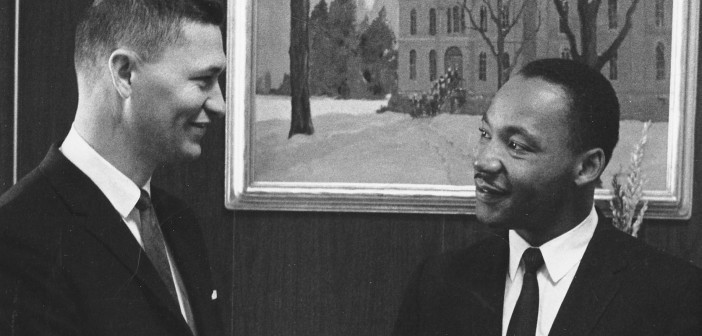Jessica Pacetti
Staff Writer
Martin Luther King Jr. (MLK) Week has become a common feature for the North Central campus. Throughout the week, there are various speeches and presentations that focus around the theme of the civil rights movement (1954-1968) and Martin Luther King Jr. himself.
However the history of what was occurring at the college during the Civil Rights Movement itself is not as common of knowledge around campus. NCC was always in session and continued with classes during the civil rights movement, but what was the college reporting on during this time in American history?
To compare events throughout the civil rights movement to events at NCC, Chronicles from the 1950s and 1960s were pooled together and dates were matched up to historical events during the civil rights movements to see what the Chronicle was writing about during this time in history. The following contrasts moments in civil rights history to the main story featured in the Chronicle.
1955
Civil Rights Movement
- December 1 – Rosa Parks, secretary the local National Association for the Advancement of Colored People chapter, refused to give up here seat to a white passenger on a Montgomery, Ala. bus. Due to her refusal she was arrested. This sparked the beginning of the Montgomery Bus Boycott that lasted 381 days (1955-1956) and was lead by Martin Luther King Jr.
North Central College
- Chronicle Issue December 2- An article titled “Arguers open season; makes good showing,” focused on North Central’s debate squad as they returned from their first intercollegiate tournament. They received the best over-all record after a 2 day tournament at Bradley University in Peoria, Ill. The team was one of 18 out of 148 teams competing in the tournament, which one all of the debates in which they participated.
1957
Civil Rights Movement
- January – Martin Luther King Jr., Ralph Abernathy, and 60 other ministers and civil rights activists founded the Southern Christian Leadership Conference (SCLC) to harness moral authority and organize power of the black churches. The SCLC would eventually help conduct non-violent protests to promote civil rights reform.
North Central College
- Chronicle Issue January 11 – The article called “NC students band for improvement” was featured on the front page of the issue and focused on students organizing a group on campus that will allow for both the student body and faculty aware of problems/situations on campus and try to find solutions to fix the complacency on campus.
1960
Civil Rights Movement
- February 1 – Four African America freshmen students at North Carolina Agricultural and Technical College began a wave of student sit-ins designed to end segregation at Southern lunch counters. The four students took seats at the segregated lunch counter of F.W. Woolworth’s in Greensboro, N.C. They refused service and sat peacefully. They returned the next day with 25 more students and repeated the same process. This sparked various protests of the same design across the South.
North Central College
- Chronicle Issue February 5 – “Cards Nose out Wheaton” by Terry Senty is an article that focused on North Central men’s basketball team winning against Wheaton Crusaders 90-88. This was an important win according to the article because this was a win ten years in the making since the last victory in the 1949-1950 seasons.
The last two items show a fuller development in the Chronicle’s coverage of the civil rights.
Martin Luther King Jr. and NCC
- November 21 – Martin Luther visited North Central College campus. He presented his speech entitled “Stride Toward Freedom” in Pfeiffer Hall during one of the regular chapel services at 11 a.m. On November 18, the Chronicle published an article called “Martin Luther King to speak on Freedom for Chapel on Monday.” This was a brief article giving an overview of the time and location of the speech. King was invited to speak at the school by the school Chaplin, Rev. George St. Angelo, and the class of 1943. Despite the importance of this visit, little remains in the College’s written records regarding King’s visit on November 21.
Civil Rights and NCC
- March 7-25, 1965– During most of the month of March Martin Luther King Jr. lead a peaceful march from Selma, Ala. to Montgomery, Ala. This march was part of the Selma Voting Rights Movement and consisted of three protest marches to walk 54 miles of the highway between the two Alabama towns. Nearly 6,000 people took part in this march including 47 NCC students. Before the march began 120 residents of Naperville, 47 being the students, traveled down to Selma, Ala. to join in the Selma Voting Rights Movement march. The group from Naperville took three buses down and arrived in time to see Martin Luther King Jr. to give his sermon at the beginning of the march at 11 a.m. then the march commenced at 1 p.m. The NCC students did not last the whole walk for they had to pull out and return to the school. These 47 students walked five and a half miles out of the eight miles on the first day before returning to Naperville. Marking their return, the Chronicle published two articles about participation in the march on March 26: “Selma Facts” by Cathy Georgis and “NC Represented at Pre-March” by Phil Eichling. The Selma Voting Rights Movement led to the passage of the Voting Rights Act of 1965.

